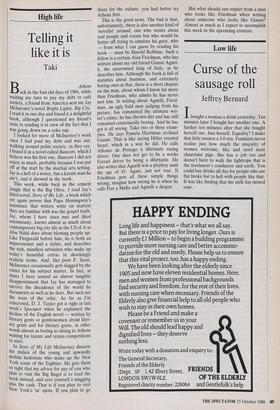High life
Telling it like it is
Taki
Athens ack in the bad old days of 1984, while
waiting my turn to pay my debt to café society, a friend from America sent me Jay McInerney's novel Bright Lights, Big City. I read it in one day and found it a delightful book, although I questioned my friend's taste in sending it in view of the fact that I was going down on a coke rap.
I looked for more of Mclnerney's work once I had paid my debt and was out, walking around polite society, as they say. I found it in a novel called Ransom, which I believe was his first one. Ransom I did not enjoy as much, probably because I was put off at the start by the martial arts setting. Jay is a hell of a writer, but a karate man he ain't, and it showed in the hook.
. This week, while back in the cement Jungle that is the Big Olive, I read Jay's third novel, Story of My Life, a book which 1 yet again proves that Papa Hemingway's insistence that writers write on matters they are familiar with was the gospel truth. Jay, whom I have since met and liked enormously, knows almost as much about contemporary big city life in the US of A as Abu Nidal does about blowing people up. Like Fitzgerald before him, he is both an impressionist and a stylist, and describes the rich, mindless urbanites who make up today's beautiful extras in shockingly realistic terms. And, like poor F. Scott, McInerney occasionally gets slagged by the critics for his subject matter. In fact, at times I have sensed an almost tangible disappointment that Jay has managed to survive the decadence of the world he documents as well as he does. But such are the ways of the critic. As far as I'm concerned, D. J. Taylor got it right in last week's Spectator when he explained the decline of the English novel — written by literary gents or gentlewomen about liter- ary gents and for literary gents, in other words almost as boring as sitting in Athens waiting for karate and tennis competitions to start.
In Story of My Life McInerney dissects the milieu of the young and upwardly mobile hedonists who make up the New York scene of the Eighties. I ie gets them so right that my advice for any of you who Plan to visit the Big Bagel is to read the book instead, and save yourself a mugging plus the cash. That is if you plan to visit New York's 'in' spots. If you plan to go there for the culture, you had better try Athens first.
This is the good news. The bad is that, unfortunately, there is also another kind of 'novelist' around, one who writes about real people and events but who would be better off trying to emulate his guru, who — from what I can guess by reading his book — must be Harold Robbins. Such a fellow is a certain Alan Friedman, who has written about my old friend Gianni Agnel- li, the uncrowned king of Italy, as he describes him. Although the book is full of statistics about business, and extremely boring ones at that, there is a short chapter on the man, about whom I know far more than Friedman, who admits he has never met him. In writing about Agnelli, Fried- man, an ugly bald man judging from his picture, has committed the ultimate wri- ter's crime: he has thrown dirt and has still remained catatonically boring. And he has got it all wrong. Take two or three exam- ples. He says Pamela Harriman civilised Gianni. That is like saying Hitler created Israel, which in a way he did. He calls Alfonso de Portago a dilettante racing driver. One does not get to be a works Ferrari driver by being a dilettante. He also writes that Agnelli was a playboy until the age of 45. Again, just not true. If Friedman gets all these simple things wrong, imagine how wrong he is when he calls Fiat a Mafia and Agnelli a despot.
But what should one expect from a man who looks like Friedman when writing about someone who looks like Gianni? Almost as much as I expect to accomplish this week in the upcoming contests.


























































 Previous page
Previous page